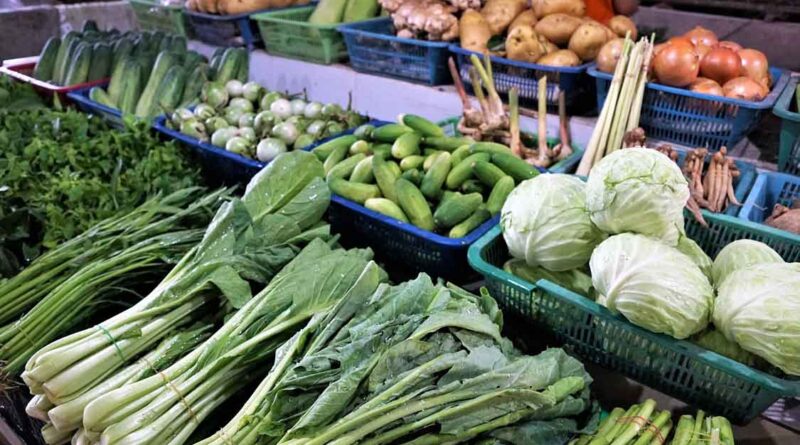Opinion: There Is A Better Way
The following was provided to SUNonline/Orillia by local farmer and sustainable food advocate Jacob Kearey-Moreland in response to a staff conclusion and report regarding licensing of food stands.
To Mayor & Council:
I have been following with interest the issue of pop-up produce stands in Orillia and on three occasions I’ve been invited to provide feedback to the City to improve this policy alongside local food related organizations which I am a member of.
As a young local farmer in Oro-Medonte and resident of Orillia, co-chair of the Sustainable Orillia Agriculture and Natural Environmental sector, resident member of the Orillia Food Advisory Committee, and a weekly produce vendor at the Orillia Farmers’ Market I strongly urge you to look beyond staff’s recommended Option 1 in favour of Option 2 recommended by the Orillia Farmers’ Market, Sustainable Orillia and the Orillia Food Committee. More specifically, please consider Option 2 with amendment to offer a licensing exemption to local producers from within Orillia and the three surrounding townships plus Rama First Nation – at the very least under a pilot period to intake feedback and improve the program.
You can read some of our rationale for Option 2 with amendment within the staff report and I have included below both staff’s comments from page 10 of the report and their conclusion, and my reply to staff’s reply opposing this amendment for your consideration.
Excerpts of Staff Comments on the proposed exemption (report p.10):
The primary purpose of licensing fees is to offset the costs of administering and enforcing the Business Licensing By-law. Generally speaking, those that make use of a service, or create the review/approval/record keeping work, should be responsible for paying for that service, as opposed to transferring the entire cost of that service to all ratepayers(see 1a) & 1b below). Should Council wish to explore waiving the annual license fee for fruit/vegetable stands, then this should occur during the 2023 budget process and include consideration of waiving the fees for other licensed businesses such as refreshment vehicles, salvage yards, taxicab stands, door-to-door salespersons, salvage yards, and adult entertainment stores(2).
In terms of the comment by Sustainable Orillia to encourage pop-up stands in residential neighbourhoods, please note that such an approach is not lawfully permitted in the City’s Zoning By-law. Retail sales of food products and/or produce is only permitted on land that is zoned in a manner that permits commercial activities including a retail store. To allow fruit/vegetable stands to operate in residential areas would detract from the residential character of the neighbourhood (3) it operates in, and potential implications include increased vehicular traffic, reduced available on-street parking, parked vehicles obstructing traffic or blocking driveways, or children in particular being struck while in the process of exiting or entering a vehicle(4).
Staff’s Conclusion
Staff recommends Option 1 which would mean having no restrictions on the origin of fruits and vegetables that can be sold from licensed stands. Staff recommends Option 1 for various reasons including that it would be the easiest to enforce of the three options (5), reduces “red tape” for owners of such stands (6), and the approach would be consistent with other municipalities in the County of Simcoe that regulate such stands(7).
Rebuttal Argument
1 a) Is Local Food a Public Good?
Staff is of the opinion that supporting truly local farmers and making locally grown food more accessible to the people in Orillia does not constitute a public service or a public good – as such the costs to “create the review/approval/record keeping work” should be borne solely by the consumers of that service (i.e. the farmer through the user fee and the consumers through increased produce costs). Now is the time for Council to decide whether or not they believe that local food is a public good and as such, worthy of further public support.
1 b) Why is business licensing in Orillia is 2.3 times more expensive than elsewhere in Simcoe County?
Further, it is important to note that it costs staff in Orillia more than any other jurisdiction to license produce stands. In fact, it costs 2.3 times more than other jurisdictions in Simcoe County on average to administer the license ($508 vs. $222.16) (see Benchmarking Exercise p.4-5). Whereas most municipalities in Simcoe County have no regulations on pop up produce stands and no fee. Why is the cost to license produce stands 2.3 times more expensive in Orillia than it is for all of our neighbours?
Are other jurisdictions subsidizing the cost of their licensing fees, or is doing business in Orillia just 2.3 times more expensive in general? Should the cost to license pop up produce stands not decrease considering there will be less red tape as is recommended by staff?
(2) Arguing for business equality – what’s next an Adult Entertainment Market alongside the Orillia Farmers’ Market?
Many believe that the business of local farming and local food distribution is categorically different from other licensed businesses including adult entertainment stores (with no disrespect to adult entertainment stores) and thus merits special status (including an exemption from certain business licensing fees and requirements). The City recognizes the unique heritage and contribution of local farmers – demonstrated through the public offering of an Orillia Farmers’ Market as a historically significant publicly subsidized venue for local farmers and local food consumers. Despite this support, there is a consistent lack of local producers vending at the Orillia Farmers’ Market, thus indicating the need for further support of this special sector in our community. Why not go further in support of local farms and food security?
There is a clear suggestion from the staff reports author, that should the city exempt local producers from obtaining a license, the city should also consider exempting other businesses including Adult Entertainment stores (pg. 10). Given the city is already subsidizing local producers through the Orillia Farmers’ Market, it follows, according to the logic of the staff report’s author that to ensure business equality the city may also retroactively consider establishing an Adult Entertainment Market that can run in tandem with the Orillia Farmers’ Market – so that all business types receive equal consideration in Orillia. Or perhaps as a matter of equality it is time to level the playing field among local businesses and end the Orillia Farmers’ Market altogether?
(3) Staff claim residential produce stands would threaten the character of our neighbourhoods.
According to city staff, having fresh local food at pop up produce stands available in our residential neighbourhoods would threaten the “residential character” (p.10) of our neighbourhoods. It is not clear how locally grown and available produce would threaten our residential character. In fact a strong case can be made that such a phenomenon would serve to enhance the character of our residential communities. Would you want to live in a residential neighbourhood that has pop up produce stands selling local produce or not?
(4) Staff claim pop up produce stands in our residential neighbourhoods would increase traffic related problems, particularly the chance of children getting hit by cars.
Staff have curiously used “Factor 5” (report pg. 6, reduced vehicular traffic as a result of more accessible produce options) to argue both in favour of Option 1 (p.6) – and against Option 2 (p.7). However, when it comes to having produce available in residential neighbourhoods staff oppose this as they claim this could result in “increased vehicular traffic” (p.10).
There is no concrete evidence to suggest that an increase in pop up produce stands in residential neighbourhoods would contribute to an overall increase in area traffic – in fact, providing food access points closer to where people live could encourage less neighbourhood vehicular traffic as noted within the Staff report (p. 6). Further, an increased and visible presence of community members in our neighbourhood and the closer proximity and greater accessibility of essential services like affordable nutritious food could serve to make our communities more walkable and safer overall.
Indeed, according to City staff in their justification for Option 1 – “As the City incentivizes increased residential growth in the core to meet Growth Plan residential projections, it will be increasingly important to ensure residents in the core have ample access to healthy produce. Increased access to produce through various retail formats such as grocery stores, specialty food stalls and farmers’ markets will support growth in the core and reduce reliance on vehicular traffic” (p. 6).
(5) Enforcement
What specifically is entailed in the enforcement of the license requirements? How would enforcement change substantively should the City adopt Option 2, and or including Option 2 with amendment? Would a simple declaration form on behalf of the stand operator suffice – as is the case for the enforcement of local producer requirements of the Orillia Farmers’ Market? Historically, what has been the cost to enforce the requirements of the Orillia Farmers’ Markets requirements – would adding a few pop up vendors change this cost substantively?
Note: the staff report’s author is incorrect when they state that the city currently does not restrict the origin of products sold in Orillia (Factor 4, pg. 6). The city restricts products sold at the Orillia Farmers’ Market to ensure the integrity of the market as a source of local goods and services as is expected by the community.
(6) Reducing Red Tape
Both Option 1 and Option 2 reduces red tape for stand owners compared to the current policy, whereas the amendment by Sustainable Orillia & the Orillia Food Committee for Option 2 would reduce red tape even further.
(7) Consistency with other municipalities in Simcoe County
Staff’s preferred Option 1 is consistent with other municipalities that regulate pop up stands – however, most municipalities in the County of Simcoe do not regulate such stands, and if they do regulate them, it is 2.3 times cheaper on average to do so – hence the staffs preferred Option 1 is categorically inconsistent with other municipalities in Simcoe County.
Conclusion
Staff’s recommended report to allow pop up produce stands to sell any produce from anywhere in the world could threaten the cultural tradition beloved and expected by the community – that such pop up stands are local producers selling local produce. Further such recommendations make no consideration for the special role of local farms in the overall fabric of our community – including our areas health and wellbeing including economic, ecological, physical and social – and that local food and food security through increasing access to local food constitutes an essential public good. It is hard to believe that anyone who has walked through a grocery store in Orillia as of late (and witnessed the barren shelves) could argue against such a small gesture of support to local farmers and area residents who rely on them that Option 2 with exemption offers.
Concerns of increased costs to administer an exemption to local producers and the purported dangers posed by pop up stands in residential areas appear to be largely unsubstantiated. In any case, whatever potential costs are far outweighed by the significant economic, ecological and social benefits of an increase in local farms and the increased availability of locally produced foods within our residential neighbourhoods that Option 2 with exemption to truly local producers would support.
In SOILidirty,
Jacob Kearey-Moreland,
Resident, City of Orillia
Local Farmer, Oro-Medonte
(Image Supplied)




